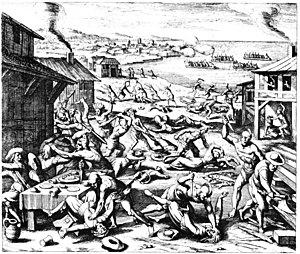Great Massacre of 1622
| Jamestown massacre | |
|---|---|

Indian massacre of 1622, depicted as a woodcut by Matthaeus Merian, 1628.
|
|
| Location | Jamestown, Colony of Virginia |
| Date | 22 March 1622 |
| Target | English settlers in Jamestown |
|
Attack type
|
Massacre |
| Deaths | 347 |
| Perpetrators | Powhatan Confederacy |
The Indian Massacre of 1622 took place in the English Colony of Virginia, in what now belongs to the United States, on Friday, 22 March 1622. Captain John Smith, though he had not been in Virginia since 1609 and was not a firsthand eyewitness, related in his History of Virginia that braves of the Powhatan Confederacy "came unarmed into our houses with deer, turkeys, fish, fruits, and other provisions to sell us". The Powhatan grabbed any tools or weapons available and killed all English settlers they found, including men, women and children of all ages. Chief Opechancanough led a coordinated series of surprise attacks by the Powhatan Confederacy that killed 347 people, a quarter of the English population of Jamestown.
Jamestown, founded in 1607, was the site of the first successful English settlement in North America, and was then the capital of the Colony of Virginia. Its tobacco economy led to constant expansion and seizure of Powhatan lands, which ultimately provoked a violent reaction.
Although Jamestown was spared due to a timely last-minute warning, the Powhatan also attacked and destroyed many smaller settlements along the James River. In addition to killing settlers, the Powhatan burned houses and crops. The English abandoned many of the smaller settlements after the attacks.
At first, the natives were glad to trade provisions to the colonists for metal tools, but by 1609 the English governor, John Smith, had begun to send in raiding parties to demand food. This earned the colonists a bad reputation among the Native Americans and precipitated conflict. They isolated the Native Americans, burned down houses, and stole their food supplies. The English violence alienated the natives further and they laid siege to the Jamestown fort for several months. Unable to secure more food supplies, many colonists died during the "starving time" in 1609–10.
The London Company's primary concern was the survival of the colony. In England's best interest, the colonists would have to maintain civil relations with the Powhatan. The Powhatan and the English realized that they could benefit from each other through trade once peace was restored. In exchange for food, the chief asked the colonists to provide him with metal hatchets and copper. Unlike John Smith, other early leaders of Virginia such as Thomas Dale and Thomas Gates based their actions on different thinking, as they were military men and saw the Powhatan as essentially a "military problem.”
...
Wikipedia
